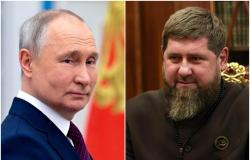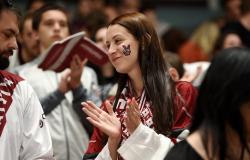
Linas Jegelevičius, specially for BNN
For the first time, all eight Lithuanian presidential candidates met in a live debate of the national broadcasting company LRT, where they exchanged opinions, discussing foreign policy, tense geopolitics, the war in Ukraine, Taiwan, Russia and Belarus.
“The positive thing is that in an otherwise boring presidential election campaign, all the candidates finally met in a televised debate. Especially the fact that behind the scenes there were rumors that two of them – the current president Gitanas Nausėda and the prime minister Ingrida Šimonytė – will not participate in such a debate at all,” the well-known Lithuanian analyst, Lithuanian news agencies told the BNN agency General Director of ELTA Vytautas Bruveris (Vytautas Bruveris).
Right from the beginning, the lawyer Ignas Vėgėlė, whose candidacy is supported by the main opposition party – “Lithuanian Green and Farmers’ Union” (LVŽS), turned against the current president Gitanas Nausėdas, who is running for a second term, and the ruling liberal and conservative government for the fact that it has not been able to agree on the appointment of ambassadors to the most important foreign embassies, such as Poland and the United Kingdom. In response, Nausėda called on Vögel to “check the latest information”, stating that the rival’s criticism was unfounded. However, a quick check of the facts shows that the Minister of Foreign Affairs Gabrielius Landsbergis and the head of state have been quarreling for more than a year about who should be appointed and where.
All candidates were asked what is the biggest challenge of Lithuania’s foreign policy
and how they would handle it if elected president. The first to speak was Freedom Party presidential candidate, lawyer, former chairman of the Constitutional Court Dainius Žalimas, who said that the main thing is the support of allies and the transfer of 260 billion euros frozen in the European Union (EU) to Ukraine.
Andrius Mazuronis, candidate of the Labor Party, said that the main challenge is the China-Taiwan issue, which, according to him, is costing the Lithuanian economy dearly. We remind you that Lithuania’s relations with China worsened after Lithuania allowed Taiwan to open a Taiwanese representative office in Vilnius at the end of 2021, instead of a mission in Taipei, as elsewhere.
Nausėda emphasized that Lithuania needs as many friends as possible
and as few enemies as possible. “The enemies are known. Unfortunately, these countries are not going to change anytime soon, and these enemies are close to us. However, our alliance with our friends, both in the EU and NATO, allows us to guarantee the safety of the citizens of Lithuania,” Nausėda said. According to him, Lithuania’s voice is being heard, and foreign partners recognize that “Lithuania plays an important role in influencing NATO and EU decisions”. Nausea’s main goal is support for Ukraine.
Veegele, who ranks second in several presidential polls, trailing Nauseida by a paltry 30%, said that the main issue of foreign policy is security, but another very important element, in his opinion, is the so-called “experimental foreign policy” of Lithuania. He mentioned the decision to allow Taiwan to open a Taiwanese representative office.
Prime Minister Ingrīda Šimonīte, the candidate of the ruling “Tēvzemes savienė-LKD”, said that “the main challenge in foreign policy and the main task is to try not to allow the erosion of the order based on international rules, and this includes everything – both our foreign policy and security policy”.
According to her, the main task that would stop this erosion is to achieve the victory of Ukraine.
The second task is to strengthen Lithuania itself, not only with the help of allies, but also by preventing Lithuania from becoming dependent on hostile regimes.
Meanwhile, Remigijus Žemaitaitis, candidate of the “Nemunas Dawn” party and member of the Seimas, said that the main challenge of Lithuania’s foreign policy is the decline of the EU. He insisted that individual EU member states are increasingly discussing possible withdrawal from the Union.
Žemaitaitis also emphasized NATO expansion as a challenge,
questioning Lithuania’s position to support all countries that want to join the bloc. In addition, he expressed concern about the proposal in the EU Council for EU leaders to give up their veto rights. Another challenge, according to Žemaitaiš, is related to the fact that the USA, although it is a strategic partner of Lithuania, increasingly prefers economic interests over security interests.
Eduards Vaitkus (Eduardas Vaitkus), a doctor by profession, said that he is “convinced” that
the main foreign policy problem is that “Lithuania is literally being led to war”.
“Several of our former and current government representatives have publicly stated that it is necessary to engage in a direct military conflict with Russia and defeat it on the battlefield. I believe that such statements can be considered the destruction of Lithuania,” said Vaitkus, whose pre-election program is called extreme and hostile to Lithuania’s national interests.
After the debate, referring to Vaitkus, Šimonite said that she saw the “Kremlin’s narrative” in his argument.
Giedrimas Jeglinskas, representative of the Democratic Union “On behalf of Lithuania”, said that the changing balance of power in the world is the biggest challenge for Lithuania’s foreign policy. According to him, there is a significant threat to the democratic way of life in the United States, the West and other countries. “Our new superpowers are trying to challenge,” said the presidential candidate.
Brewer says the gap between Western and pro-Russian views on world order and foreign policy was visible in the debate, “perhaps for the first time.”
“We have two candidates (Vaitkus and Žemaitaitis – LJ) whose views on many issues coincide with the Kremlin’s,” he said.
Even Veegele, who agrees that Russia is a threat to Lithuania, emphasized that relations with neighbors like Russia should be “very pragmatic to avoid military conflicts.” Jeglinski emphasized that “chauvinistic countries should be treated in the same way as countries with a hooligan mentality and who only understand the power of the fist.”
Mazuronis said that it is difficult for him to imagine relations with Russia,
but speaking of Belarus, he said that Lithuania, knowingly or unknowingly, “is trying to mix God’s gift with scrambled eggs”. According to him, there should be two strategies regarding Belarus. One should refer to the strengthened regime of Belarusian President Lukashenko, the other to relations with the Belarusian exile community in Vilnius.
“The question is whether we will get these people to be hostile towards us, or rather positive,” said Mazuronis.
Veegele attacked Nausied, arguing that China’s pressure on Taiwan is not a policy of values at all, but a policy of favoring the current president. He claimed that the company “Teltonika”, which received significant funding from Taiwan, and its owner, Arvydas Paukstys, supported Nausea’s presidential election campaign with almost 18,000 euros. Nausėda did not deny it, but invited his closest competitor to “look where Teltonika works and with which EU countries it cooperates”.
“It is a global company that cooperates with like-minded countries,” stressed Nauseda.
Brewer says he doesn’t think the debate will change the candidates’ current position in the polls or voter sentiment.
“However, a segment of our society needed this kind of debate,” Brewer said.
According to him, the biggest intrigue in the election is whether it will be necessary to hold a second round.
“There is no doubt that Gitan Nausėda would like everything to end in the first round, but to be honest, I am not sure whether everything will be decided already on May 12,” said the director of ELTA.
Follow us too Facebook, To friends and X!
Tags: BNN investigates boring Lithuanian presidential election campaign finally twist live debates BNN
-




